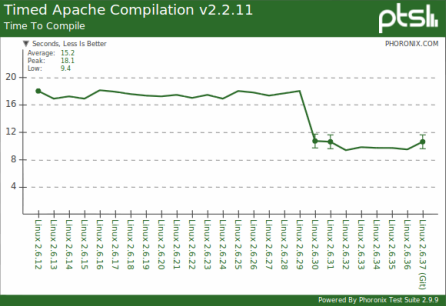Adding new features to Linux has not affected core performance

Phoronix has published the results of a series of benchmark tests on the past five years worth of Linux kernels, from Linux 2.6.12 through to Linux 2.6.37 (dev) releases. The results show that on the whole, new features have not bloated the OS or hit performance.
The tests run on the kernels were part of the Phoronix Test Suite and included GnuPG, Gcrypt, OpenSSL, NASA NAS Parallel Benchmarks, TTSIOD 3D Renderer, C-Ray, Crafty, MAFFT, Himeno, John The Ripper, LAME MP3, 7-Zip, BYTE, Loopback TCP Network Performance, timed Apache compilation, Apache web-server, PostMark, FS-Mark, IOzone, Threaded I/O Tester, and PBZIP2. The test system was a Core i7 970 host system was running Ubuntu 10.10 64-bit with the Linux 2.6.35 kernel with 3GB of DDR3 system memory, a NVIDIA GeForce GTX 460, and a 64GB OCZ Vertex SSD. The 64-bit FC4 virtual machine used KVM virtualization.
Some tests show how performance in Linux has improved, such as this timed Apache compilation:
And this PostMark disk transaction test:
Others do show a drop in performance, such as this 1GB file encryption using GnuPG:
But on the whole, the graphs show very little change in performance and look like this:
Out of 22 tests carried out, 14 show pretty much a flat lined chart.
It would be interesting to see how Windows performance in key areas has changed over the past few years.
